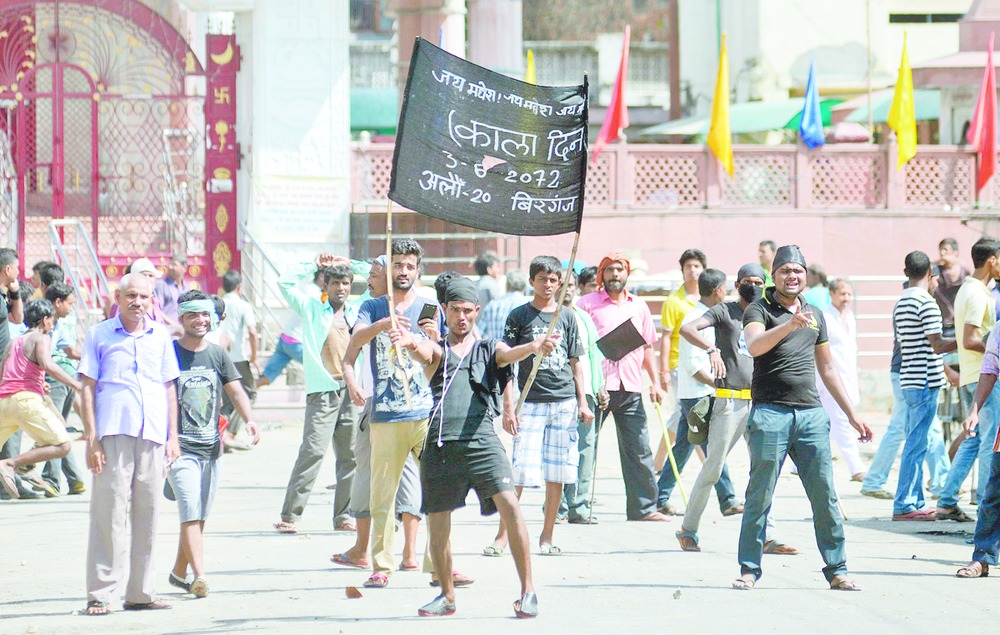
New Delhi, Sept. 23: India is bolstering its defence against allegations of "external interference" in Nepal amid continuing violence there against a controversial new constitution even as the Narendra Modi government grapples with regional isolation and the stirrings of a backlash.
The Sashastra Seema Bal (SSB), the paramilitary force that monitors the 1,700-km border, was yesterday asked to enhance scrutiny of vehicular and personnel movement into India following fears the violence could spill into this country, senior officials here said.
But a growing clamour from Nepal critical of India's public positioning against key elements of the constitution promulgated by Kathmandu on Sunday has left New Delhi worried about deeper diplomatic damage in its neighbourhood. A social media campaign from Nepal - #BackOffIndia - that accused New Delhi of interfering in Kathmandu's decision-making had yesterday evening emerged among top-trending subjects globally on Twitter.
The Madhesi and Tharu communities, which constitute over 40 per cent of Nepal's population and predominantly live in the country's plains, have been protesting the new constitution that they argue gives them little local autonomy, and inadequate central representation.
India has been urging Nepal to work towards a consensus before promulgating the constitution - advice that was turned down when the country codified the document this past weekend - but today denied suggestions that it had handed over any list of changes it seeks.
"Without being prescriptive on specific clauses," the foreign office said in a statement today, "we continue to urge that issues on which there are differences should be resolved through dialogue in an atmosphere free from violence, and institutionalised in a manner that would enable broad-based ownership and acceptance."
India's challenge with Nepal is also compounded by the warm congratulatory messages both China and Pakistan have sent Kathmandu, in stark contrast with New Delhi's cold signals of unhappiness and its refusal to welcome the new constitution.
India's regional bugbears, Pakistan and China, have long tried to woo Nepal away from New Delhi, efforts Prime Minister Modi has tried to counter through an unparalleled focus on Kathmandu.
"Right now, India appears pretty isolated on Nepal's constitution, though of course India's position, because of the shared border, is also unique," Sangeeta Thapliyal, professor of inner Asian studies at Jawaharlal Nehru University who just returned from a visit to Nepal, told The Telegraph. "And unless India is careful, it could end up hurting its interests and those of the communities in Nepal's plains."
For India, the charge of "interference" in Nepal isn't new - the allegation flew earlier this year, when Indian military and paramilitary personnel rushed to help the country recover from a debilitating earthquake. Some Indian media channels too were accused of focusing more on the "heroic" work of India's forces than on the stories of the victims.
But Indian officials argued that the clashes in Nepal's plains over the constitution were impossible to ignore for New Delhi, both because of the direct implications of instability on India's security, and because of historic ties with the Madhesi community.
India served as a guarantor for agreements between the parties representing Nepal's plains and hill communities during the 2008 and 2013 constituent assembly elections. Failure to speak up against perceived discrimination against the plains would hurt India's credibility, the officials argued.
Nepal's major political parties had also indicated to India on multiple occasions in the past that they were willing to work towards a political consensus before passing a constitution - and the promulgation represents a betrayal, officials here said.
But India's criticism of the new constitution, and decision to publicly align itself with the Madhesis in Nepal, could backfire, Thapliyal said. "Over the years, Madhesis have come to be seen by hill communities as a constituency of India," Thapliyal said.
"India's positions could end up reinforcing that perception."
By contrast, both Islamabad and Beijing have sent warm welcome messages to Kathmandu. "We felicitate the government and the political parties of Nepal on this achievement. The President and Prime Minister of Pakistan have congratulated the President and Prime Minister of Nepal on this historic development," Pakistan foreign office spokesperson Qazi Khalilullah said yesterday.
Hong Lei, China's foreign ministry spokesperson, also congratulated Nepal.











